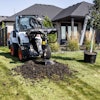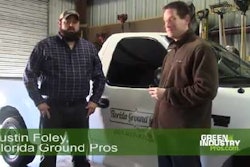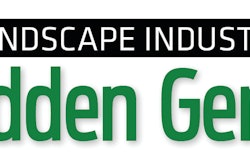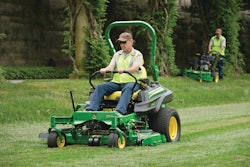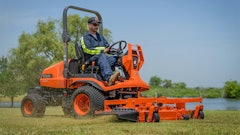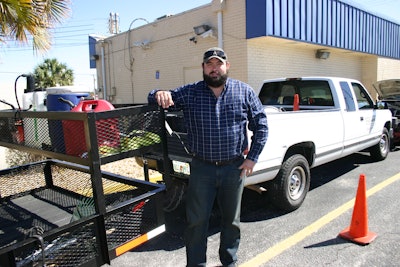
Some landscape contractors are content staying at the one- or two-crew level. In fact, it's what they prefer. But others aren't. You can throw Justin Foley into the latter category.
Foley was working for a popular grocery store chain in the mid-2000s when he started up a part-time lawnmowing business in Lakeland, FL, roughly 40 miles east of Tampa. By 2009 he'd tapped into a nice niche: mowing foreclosed homes. Soon this one-man band was generating enough revenue to make it a full-time job. Yes indeed, Justin Foley had been bitten by the entrepreneurial bug.
Aspirations quickly developed to become a more traditional commercial/high-end residential landscape maintenance provider. Foley joined a group of area business leaders and started networking. Enough traditional clients were lined up that he felt comfortable getting out of his foreclosure niche which had become plagued by lowballer competition, slim margins and slow-paying customers.
With intent to convey a more professional, authoritative persona, the company name was immediately changed from Foley's Lawn Service to Florida Ground Pros. Foley split his time running crews and pounding the pavement looking for new clients. Over the next few years, annual sales ballooned from just under $100,000 to roughly $550,000. Foley and Florida Ground Pros were well on their way.
But something just didn't feel right. As sales grew, so did everyone's stress level. Maintaining control of production and administration was getting harder by the week. Old debt seemed to be holding the company back. Life at half a million wasn't all sunshine and roses as Foley had hoped. Could it ever be?
With the help of business consultant Steven Cohen of Greenmark Consulting Group, Foley is trying to figure that out. He's recognized that his company has to change, as does he as an owner. What has worked to get Florida Ground Pros to this level—a tenacious sales effort and great customer service—is not enough to get it to the next one. Foley is now adapting his role as owner to place more focus on budgeting and estimating, improving operating systems, and creating a company culture that establishes top-down accountability and instills pride in every single employee.
How they got this far
For Florida Ground Pros, that proverbial "next level" represents a revenue jump of about $150,000 (30%) to $700,000—which will require the addition of a seasonal employee to the existing team of eight full-timers and one part-timer. Regardless, if everything comes together, sales-per-employee should climb to a very healthy level and allow for better overhead recovery and debt reduction.
This is an aggressive goal, for sure. But the building blocks are there. Foley is extremely confident in the employees he now has in place. The company has a good mix of commercial clients including multi-location retail centers and restaurants, corporate facilities and HOAs, and high-end homeowners. Customer retention has remained north of 90%.
"I realize that this business is really a relationship business; we just happen to provide landscaping services," Foley says. "We built our business off of our original commercial clients here in Lakeland. As they opened new stores around the area, we picked up more work." For example, Florida Ground Pros has a crew based in Orlando, roughly an hour from Lakeland, primarily to service some stores for their largest account.
Florida Ground Pros is also constantly looking for the "four-corner opportunity". Foley explains, "When we're servicing an account, we knock on the doors of other businesses right around it. Cold calls and hitting the pavement is really what got our name out there. And we had to work some of those accounts a year or two before we got anything. Getting in touch with them every month or so to see how everything is going and remind them that we're still here—that goes a long way."
Foley is continuing with this approach to help chase down that additional $150,000 in new sales. He also has hopes of landing more work in the multi-family sector, i.e. apartments and condos.
Three new areas of focus
Regardless of how long it takes for that additional $150,000 in revenue to come in—or if it even comes in at all—Foley also recognizes that some things need to change on the back end now that his company is the size it is.
"We now need better systems to help grow our employees, and improve our procedures as we continue to get larger clients and more high-end clients," Foley points out. "We can only be successful if we train our employees correctly, they understand what their responsibilities are, and they know what they need to do from site to site. Now that we're as big as we are, our systems need to get a little more specific."
With help from consultant Steven Cohen, Foley has identified three key areas of immediate systems improvement.
Budgeting and bidding. Foley is making sure he fully understands his company's total overhead and how it should be allocated to jobs. He has been inadvertently underpricing, albeit modestly, as a result of underestimating overhead. By accurately accounting for overhead recovery, his prices should still be competitive while also helping bring in thousands of additional dollars per year. This, in turn, will help the company pay down debt and invest back into the business.
Operations consistency. As is the case with most companies that grow very quickly, there has been a lot of flying by the seats of pants at Florida Ground Pros. Foley is working to develop and refine systems for how the company starts and ends each day, and everything in between. This goes for both field crews and office staff.
In the office, Foley would like to see a more consistent schedule of when certain tasks get done. For example, these things happen on Monday, these on Tuesday, and so on. A more consistent manner in which each task gets done is also desired. In administration, consistency and predictability breed efficiency and reliability. Additionally, Foley wants to develop a clear, consistent procedure for managing receivables—because Florida Ground Pros has been burned here before.
In the field, Foley says the company needs updated job descriptions and standards for crewmembers. Also, Foley's wife Shawna, who works part-time in the business, is spending a considerable amount of time revamping the company's communications sheets which enable crew leaders to take job notes and allocate their time on jobs. "Our communication sheets need to be more specific so we can get a better handle on how long it really takes to mow vs. edge vs. spread mulch, and so on," Shawna says. This, in turn, ties back to focus #1 (budgeting and bidding), along with the third and final immediate focus: accountability and building a culture.
Company culture. "We're looking to improve our culture—and let our people know we're here to support them so they can grow with us," Foley points out.
"A lot of it starts with me, the owner and leader," Foley adds. "If I don't do things the right way and follow through on things, my entire company is going to suffer. We want to be in that $1 to $2 million range in five years. I don't want to get in the way of our own success. You have to be open to change and willing to listen to other opinions. Our new consultant, Steven Cohen, is one part of that.
"The other part is seeking input from our employees," Foley continues. "It's not just 'my way or the highway' anymore. We now have tailgate meetings every Friday. The first priority is to go over safety items. But then we open it up for discussion, looking for concerns, opinions and ideas our crews might have. My job as owner is to make my employees' jobs as easy as possible."
Ready to roll up some sleeves
Good equipment, thorough training, effective processes and clear expectations go a long way in achieving just that. Then, it's about making sure employees feel like there is a longer-term future with Florida Ground Pros that extends far beyond the next paycheck.
"We're reworking our company mission statement," Foley points out. "I'm going to want it plastered all over our shop. As the owner, I need to create something our employees believe in and see opportunity in."
For example, once the company jumps to the $700,000 level, Foley is hopeful he'll be able to add a field supervisor to oversee quality control. This will allow Foley to spend more time on sales, training and systems development.
Until then, though, it's definitely going to be a lot of work. "This is going to be a tough year," Foley says. "We'll be taking our four-man crew in Lakeland and splitting it into two 2-man crews. The additional seasonal employee we hire this year will float between the two crews as needed. And on our really large sites, both crews will work together. We're basically going to be looking to do more with less by being more efficient and consistent, which is why it's so important to improve our systems and procedures."



